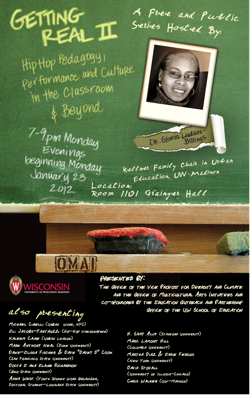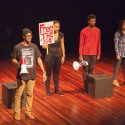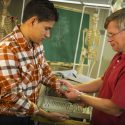Hip-hop teaching, performance and culture
Using hip-hop pedagogy as a teaching tool to integrate topics from history, politics and art to culture and performance in the classroom will be the topic of the second annual lecture series “Getting Real II” at the University of Wisconsin–Madison this spring.

The free 15-week lecture series will begin Monday, Jan. 23 in Room 1101 Grainger Hall and is sponsored by the UW–Madison Office of the Vice Provost for Diversity and Climate and the Office of Multicultural Arts Initiatives (OMAI). Each week’s lecture will begin at 7 p.m. and all are free and open to the public.
The series features internationally renowned educator and specialist on multicultural education UW–Madison professor Gloria Ladson-Billings as host and a slate of guests from the top universities and leaders in the growing field of hip-hop studies.
This year’s series will examine how the pedagogy imbedded in traditional spoken word and the contemporary hip-hop movement is being used by educators to teach a broad range of traditional topics in the classroom and serve as an innovative approach to engaging students who have been historically under-served by traditional schooling.
Ladson-Billings is the current Kellner Family Professor of Urban Education in the Department of Curriculum & Instruction at the University of Wisconsin–Madison and the 2005-2006 president of the American Educational Research Association. Her research examines the pedagogical practices of teachers who are successful with African American students.
Guest lecturers will focus on how hip-hop culture and culturally relevant teaching can serve as innovative approaches to help bridge the achievement gap in our nation’s public schools through the creation of new strategies and curricula.
“Educators give lip service to the concept of ‘critical thinking’ but reduce the concept to the ability to perform on sections of standardized tests of conventional reading,” says OMAI Executive Director Willie Ney, whose office oversees the nation’s only college-level program dedicated to teaching through the use of hip-hop.
The internationally recognized First Wave Hip-Hop Theater Ensemble is now in its fifth year at UW–Madison.
“The basic premise of the series is that true critical thinking is stimulated through a critical pedagogy-one that challenges typical orthodoxy to help students ask incisive questions about the nature of the current social, political, economic, and cultural order,” Ney says.
One of the more innovative strategies for engaging students in critical thinking is through hip-hop culture, Ney adds. Similar to the work of the 1950s and 1960s citizenship schools and freedom schools, New Studies (e.g. black studies, Chicano studies, women’s studies) and popular culture studies, hip-hop culture pulls on the organic and local culture of students to help them see the ways grassroots movements engage learners and help produce transformation.
“This series will pull on educational theories such as socio-cultural theory, culturally relevant pedagogy, critical media theory, post-colonial theory and critical race theory to help participants connect hip hop as both an art form and a pedagogical tool to improve the academic success of students who remain marginalized in our schools,” Ney says.
Here is the schedule for “Getting Real II: Hip Hop Pedagogy, Performance and Culture in the Classroom and Beyond,” Monday evenings at 7 p.m., Room 1101 Grainger Hall:
Jan. 23 – “Getting Real II: Setting the Stage, Gloria Ladson-Billings, the Kellner Family Professor of Urban Education in the Department of Curriculum and Instruction at UW–Madison and Michael Cirelli, director of Urban Word of New York City, director of the annual Spoken Word and Hip-Hop Teacher & Community Leader Training Institute at UW–Madison, and the annual Preemptive Education conference at New York University.
Jan. 30 – A night of hip-hop film shorts curated by film director Eli Jacobs-Fantauzzi.
Feb. 6 – “Why the Charter School Movement Has It Wrong and How We Can Make It Right” featuring guest speaker Kaleem Caire, CEO Urban League of Greater Madison.
Feb. 13 – “When You See Me, See You: Hip-Hop, Wealth and Social Justice,” professor Mark Anthony Neal of Duke University.
Feb. 20 – Guest Speakers assistant professor Dawn-Elissa Fischer and adjunct professor and journalist Davey D of San Francisco State University.
Feb. 27 – “Developing Critical Hip-Hop Feminist Literacies of Black Womanhood in an Afterschool Program,” featuring Docta E, also known as professor Elaine Richardson of Ohio State University.
March 5 – “Everybody Make Some Noise: The Audience Dynamic in Youth Spoken Word” with Anna West, youth Spoken Word organizer and doctoral student from Louisiana State University.
March 12 – “Global Ill-literacies: Hip Hop Culture(s), Youth Identities, and the Politics of Literacy,” featuring associate professor Samy Alim of Stanford University.
March 19 – “Partners in Rhyme: Hip-Hop and Global Democracy,” Gloria Ladson-Billings.
March 26 – Guest speaker and author Marc Lamont Hill of Columbia University.
April 9 — “Re-Imagining Teaching and Learning: A Snapshot of Hip-Hop Education” featuring guest speaker New York University adjunct professor Martha Diaz and Eddie Fergus, deputy director of the Metropolitan Center for Urban Education and research assistant professor in the Humanities and Social Sciences Department at New York University.
April 16 – Guest speaker TBA.
April 23 – “Into the Traffic Jam: Contradictions, Interruptions, Classrooms and Hip-Hop” featuring guest speaker associate professor David Stovall, University of Illinois-Chicago.
April 30 – “First Wave Pedagogy: Roots to Routes to Roots” featuring Christopher Walker, UW–Madison assistant professor of dance and First Wave Hip-Hop Theater Ensemble artistic director.
May 7 – “Final Cypher: Showcase Performances of Curriculum and Instruction,” featuring 375 seminar participants. This event will be held at 7 p.m. in the H’Doubler Performance Space in Lathrop Hall, 1050 University Ave.
For more information on the series call 608-890-1006.
Tags: arts, diversity, events, School of Education



